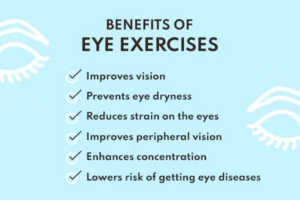Do eye exercises help to improve your vision?
Doctors always recommend exercise to improve our health. But have you ever thought about eye exercise? Do eye exercises help to improve your vision?
So, do you want to read more on this? If yes, then welcome because you are on the right spot because, in this article, we will be going to discuss it. Now, if that sounds interesting to you, then let us begin.
Table of Contents
Do eye exercises help to improve your vision?
When you do eye exercises, you train your eye muscles, which may help you see better and postpone the need for glasses or contacts in some individuals.
Read More: How to improve your eyesight without glasses?
Several underlying problems impact eyesight, including myopia (nearsightedness), farsightedness, and astigmatism that this treatment will not fix (an imperfection in the eye structure that causes blurry vision).
There are a variety of physical and environmental variables that may impact vision; some of these issues need the use of corrective lenses, while others can be improved with eye exercises or vision therapy.
To discover the particular reasons for your symptoms, you should first consult with an optometrist or ophthalmologist.
Do Eye Exercises Work?
Eye exercises may be practical for a variety of eye conditions, including the following:
- Reducing the pressure on the focusing muscles caused by the eyes
- Increasing the size and strength of the focusing muscles that govern eye alignment
- Increasing the effectiveness of eye-tracking difficulties
- Blinking is stimulated, which may help to alleviate dry eye problems linked with computer viewing.
Because the actual architecture of your eye might influence how you see, training your eye muscles will not prevent the most common vision problems that need the use of glasses or contact lenses, such as those described below:
Nearsightedness occurs when the length of your eyeball is too lengthy, causing light rays to travel too far to reach a point of focus on your retina.
Farsightedness occurs when your eyeball is too short, resulting in light rays entering your eye and arriving at a point of focus outside your retina.
Due to the uneven shape of your cornea, light rays that enter your eye divide into multiple points of focus, resulting in hazy vision. Astigmatism may be treated by using glasses or contact lenses.
Read More: How to improve long-distance vision?
Presbyopia is a condition that occurs due to the natural lens of your eye losing its suppleness and being unable to move effectively enough to focus on close-up things.
Glaucoma is a collection of disorders that affect the optic nerve and lead it to become damaged.
Macular degeneration is a condition associated with the degradation of the central region of the retina (macula), which is the inner rear layer of the eye that stores pictures and transmits them to the brain via the optic nerve after it has been damaged. This portion of the eye is responsible for your ability to read, operate a vehicle, recognize people or colors, and perceive things in exquisite detail.

